|
|
|
Sort Order |
|
|
|
Items / Page
|
|
|
|
|
|
|
| Srl | Item |
| 1 |
ID:
132672
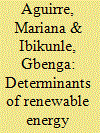

|
|
|
|
|
| Publication |
2014.
|
| Summary/Abstract |
We investigate factors influencing country-level renewable energy growth by applying FEVD and PCSE estimation methods in a unique sample analysis. With a longer time series (1990-2010) and a broader sample size of countries (including Brazil, Russia, India, China and South Africa) than previous studies, our results reveal new insights. The results suggest that certain government-backed energy policies impede renewable energy investments, thus implying significant failures in policy design. These policies may be failing mainly because of uncertainty and the likelihood of discontinuity. Weak voluntary approaches are introduced in order to satisfy public demand for more sustainable investments and programmes; we find that these may have negative influences on the growth of renewables as well. The insight gained is consistent over the estimation methods employed.
|
|
|
|
|
|
|
|
|
|
|
|
|
|
|
|
| 2 |
ID:
136726
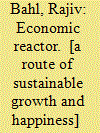

|
|
|
|
|
| Publication |
Kolkata, Rajiv Bahl, 2014.
|
| Description |
374p.Hbk
|
| Standard Number |
9789384333690
|
|
|
|
|
|
|
|
|
|
|
|
Copies: C:1/I:0,R:0,Q:0
Circulation
| Accession# | Call# | Current Location | Status | Policy | Location |
| 058104 | 333.7924/BAH 058104 | Main | On Shelf | General | |
|
|
|
|
| 3 |
ID:
127234
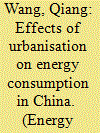

|
|
|
|
|
| Publication |
2014.
|
| Summary/Abstract |
As a key issue in China's economic development, urbanisation creates increasing pressure on energy supply and the natural environment. Thus, a better understanding of the relationship between urbanisation and energy consumption is necessary for Chinese decision makers at various levels to address energy security and sustainable economic and social development. This paper empirically investigates the effects of China's urbanisation on residential energy consumption (REC) and production energy consumption (PEC) through a time-series analysis. The results show that compared with rural areas, urbanisation slows per capita REC growth because of the economy of scale and technological advantages associated with urbanisation but has greater promotional effects on the growth of REC and the improvement of REC structure. The economic growth caused by urbanisation most significantly contributes to an increase in PEC, whereas technological advancement was found to reduce the scale of PEC (except from 2001 to 2005). Finally, the structural effect of the energy supply increased rather than decreased China's PEC, and the effect of industrial structure adjustment on PEC was found to be insignificant.
|
|
|
|
|
|
|
|
|
|
|
|
|
|
|
|
| 4 |
ID:
127267


|
|
Heat roadmap Europe: combining district heating with heat savings to decarbonise the EU energy system
/ Connolly, D; Lund, H; Mathiesen, B.V; Werner, S, Möller, B, Persson, U, Boermans, T, Trier, D, Ostergaard, PA, Nielsen, S
|

|
|
|
|
| Publication |
2014.
|
| Summary/Abstract |
Six different strategies have recently been proposed for the European Union (EU) energy system in the European Commission's report, Energy Roadmap 2050. The objective for these strategies is to identify how the EU can reach its target of an 80% reduction in annual greenhouse gas emissions in 2050 compared to 1990 levels. None of these scenarios involve the large-scale implementation of district heating, but instead they focus on the electrification of the heating sector (primarily using heat pumps) and/or the large-scale implementation of electricity and heat savings. In this paper, the potential for district heating in the EU between now and 2050 is identified, based on extensive and detailed mapping of the EU heat demand and various supply options. Subsequently, a new 'district heating plus heat savings' scenario is technically and economically assessed from an energy systems perspective. The results indicate that with district heating, the EU energy system will be able to achieve the same reductions in primary energy supply and carbon dioxide emissions as the existing alternatives proposed. However, with district heating these goals can be achieved at a lower cost, with heating and cooling costs reduced by approximately 15%.
|
|
|
|
|
|
|
|
|
|
|
|
|
|
|
|
| 5 |
ID:
127241
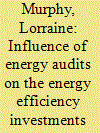

|
|
|
|
|
| Publication |
2014.
|
| Summary/Abstract |
Energy audits are promoted as an effective tool to drive investment in energy efficiency measures in the residential sector. Despite operating in many countries for several decades details of the impact of audits are mixed. The aim of research presented here is to explore the role of audits on investment in energy efficiency measures by private owner-occupied householders in the Netherlands. Results showed that the main influence of the energy audit was to confirm information held by householders. A significant portion of audit recommendations was ignored, the main reason being that householders considered their dwellings to be adequately energy efficient. A comparison of audit recipients to non-recipients showed that audit recipients did not adopt, plan to adopt or invest in more energy efficiency measures than non-recipients. In fact non-recipients adopted more and invested more in measures. It is concluded that energy based renovation is driven by householder perception of comfort and acceptable outlay on energy bills and not necessarily to expert technical tailored information on the potential to reduce CO2 emissions and environmental impact. Results support arguments for minimum energy efficiency standards and performance based incentives.
|
|
|
|
|
|
|
|
|
|
|
|
|
|
|
|
| 6 |
ID:
169898
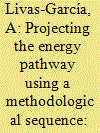

|
|
|
|
|
| Summary/Abstract |
The relationship between primary energy and economic development tends to be positive; however, it is a complex relationship for emerging economies. We use the energy pathway (EP) method to 1) examine this relationship, 2) introduce its behavioural taxonomy and 3) propose a hybrid methodological sequence, that allows to examine the historical context and to forecast the EP.
|
|
|
|
|
|
|
|
|
|
|
|
|
|
|
|
| 7 |
ID:
138383
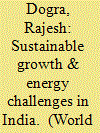

|
|
|
|
|
| Summary/Abstract |
It relies on significant amounts of energy from foreign sources and, as such, India is a price taker, not a price setter. India can reduce its vulnerability to energy price fluctuation through a flexible and competent energy market, but it cannot isolate itself from price volatility. At the same time, to expand its energy supply capacity to meet the rapidly growing energy demand of its people, India needs more investment. A significant portion of the required investment must come from foreign investors, for whom it competes with other countries. This implies the necessity of integrating India’s energy institutions and policies with global practices.
|
|
|
|
|
|
|
|
|
|
|
|
|
|
|
|
|
|
|
|
|